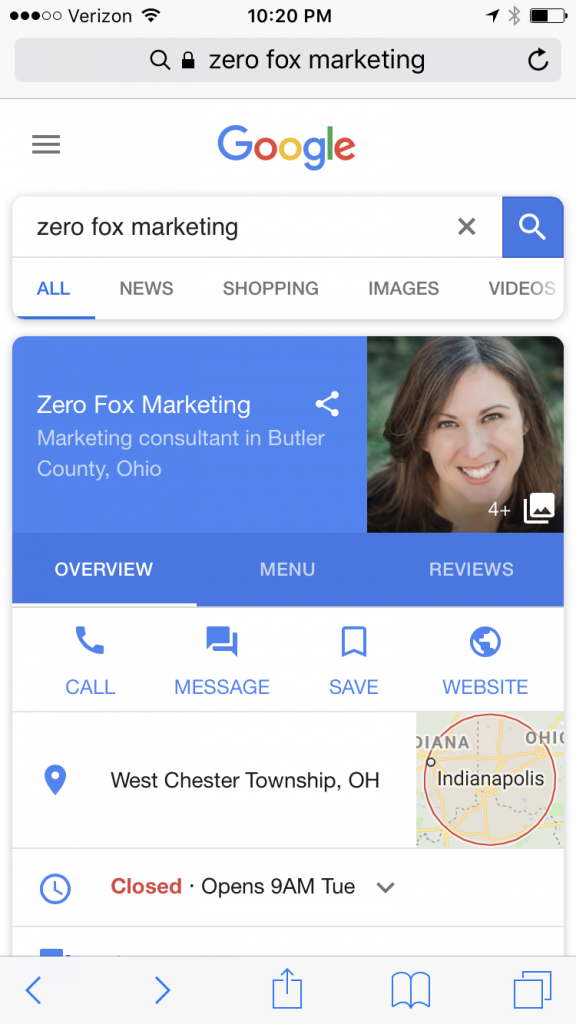I took a good four months off from writing on this blog. With client and family obligations, it just wasn’t in the cards for me to write a good, meaningful post.
I thought I’d break my blog hiatus with a topic about…you guessed it…blogging! You tell me if it was worth the wait…
Blogging and SEO: Story Time
I was talking with a business owner last year about whether a concentrated effort on SEO was right for his business given his budget, the competition, and other factors. He asked one question that made me laugh:
You’re not just gonna tell me to blog more, are you?
I laughed. Because if I didn’t, I might have cried.
- A marketing person had told him that a key to SEO was blogging, but didn’t help him understand why or how to do it right.
- He had a blog on his site based on that advice.
- He hated anything to do with blogging because it ate up time and resources, which were all wasted because the blog was ineffective and not doing a darn thing for him.
Is a Blog a Good Tool for SEO?
Nothing I could write here would tell you definitively whether or not your company should blog, either for SEO or some other marketing reason.
Can blogging be an effective marketing and SEO tactic? Yes.
Can blogging (or any tactic, for that matter) be a colossal waste of time? Also yes.
The difference is purposeful execution.
Clarification: Blog = Consistently Updated Content
I’d like to take a moment here to offer some clarification. For the purposes of this post, when I say blog, I mean any area of your website that has consistently updated content on various topics.
Maybe you call it a blog. Maybe you call it a “Learning Center.” Maybe you call it “News” or articles.
Call it whatever you want, but at it’s core, its current content. I’m using blog as the umbrella term here.
How Blogging Works to Help SEO…Ideally
You can’t talk about SEO without talking about Google. And you can’t talk about Google without talking about how Google operates and makes money.
Google (by and large) makes money by anticipating what people want, and delivering it (and then selling ads within that delivery framework).
It follows, then, that we can’t think about what Google wants without thinking about what people want. (As I’ve said before: if humans like something, Google likes it, too.)
So, let’s think about why you, as a user of a search engine, might like blogs.

- People who use search engines like timely information. There’s nothing worse than going to a website and finding information that was last updated in 2015, and is no longer relevant.
- People who use search engines need information and have questions. Did you see the comic above? Does it resonate with you? Think about the last few Google searches you’ve made. Do you use Google to find answers to your questions or get information?
- People like to get information and have questions answered (and they usually like it to come free/easily). Did you ever see something on the Internet that sounded like it would be useful, but then you read it and realized it was just a vague piece of fluff that tried to sell you something without giving you anything in return? How did you feel about that?
Now let’s see here. If you were a Google engineer trying to make an algorithm (or computer formula) to serve people search results that mattered to them, what would you reward?
Based on the above, you’d probably reward websites with a) timely content, b) content that answered people’s questions, and c) content that was meaningful and valuable. If a website had those things, you’d make them rank higher, so that people who were searching could find them more easily. You’d reward good content because it makes Google a better tool by proxy.
In other words, you’d reward blogs.
That’s why, in simple terms, a good blog can help SEO. If you have fresh, meaningful content that gives people information and answers questions, your website has a better chance of ranking for related terms (both for the post itself, and your website in general).
Blog Topics: For SEO and Other Reasons
SEO is a big reason to write a blog, but it’s not the only reason.
For example, most of my own business comes from referrals and networking, so I write a blog because it 1) provides content for my email marketing, and 2) it provides content for my social media marketing. Both of those channels nurture referrals more than the blog itself, but also require current content that’s of value.
Other companies use blogs as a client retention tool. For example, they provide ongoing information to build community and cross-sell by providing information.
Most blogs are a hybrid. It’s that hybrid purpose that creates a prime ground for useless blog topics, because there is often not a clear direction on what to write about.
And if you “phone in” your company’s blog, you might as well not write it at all. If your marketing team struggles all the time to find anything good to write about, and all your posts end up being a couple of paragraphs that don’t really offer any value, it’s not going to bring you results.
For example, let’s say that your family business is celebrating it’s 50th anniversary. Should you write a blog post about it?
- If you have unlimited time and money, sure. Google likes fresh content, so any post that’s timely would give you a simple point in that column.
- If there’s a marketing reason to write it, sure. Maybe your closest competitor just closed down. A post about your longevity could be a boon for scared customers looking to switch. Maybe your closest competitor is the new kid on the block. A post about your history could be a differentiator. Maybe you held a big bash and you invited the local news station, and they covered it because you’re a well-respected business in town. Then by all means, write it and give your business more clout. Just make sure you promote the post in other ways, too. While some eyeballs may land on it just by virtue of it being on your site, you’re probably going to need to do a little more work than that.
- But if what you really want is more search traffic from people that don’t already know your company, and you’re tight on resources to boot, I’d skip it. Even if it would only take a short time to write, a purely corporate topic isn’t going to get you much in the world of Google. Time spent on that post is time you could have invested in another more strategic post for SEO. (There is literally no chance that a prospective customer who doesn’t know your name is going to be Googling anything about your company’s 50th anniversary.)
SEO-focused blogs are honestly the hardest to write. Why? Because if your primary goal is to get and convert search engine traffic from your blog, and you don’t take time to carefully consider what people search for to help determine your topics, you’re doing your business a disservice.
It really can work. Just ask this guy who saved his pool business, and did so well at it that he started a content marketing company. Finding the right topics just takes skill and time.
How to Choose Topics People are Searching For
Remember what I mentioned earlier: people use Google because they need information and want answers to questions.
And who asks your company questions every day? Your customers.
Ask your sales team what questions they get asked on sales calls. Ask your reps what questions they get on customer service calls. Ask your admins what they see and hear everyday. Comb through chat logs. Read old contact form submissions. Read over your notes from old meetings. Look at any sources of customer dialog you have, and you’re bound to see common threads.
Then put phrases about those common threads into Google’s Keyword Planner.
Look for a longer-tail phrase that has some volume, and then Google that phrase yourself.
Are the top 5 results similar to the topic you’d write about? Who else is ranking for it? What kind of content are they writing about it? Are they similar to you? Could you offer more value than they have?
If it’s a topic with volume, and it has the right context based on the questions above, then you’ve probably found a good blog topic.
Another related strategy (and natural next step to the above) is to create topic clusters. Choose an overall topic where you think you have the potential to get search traffic, and write several good posts centered on related themes, questions and phrases. Google will see these pieces as related, and can use their context to help match your content with what people are searching for if applicable.
Practical Examples of SEO-Based Blog Topic Selection
Example #1
I am working with a client that sells a particular type of equipment. I noticed that prospective customers kept asking questions about which brand and size of that equipment would be needed for different applications.
I did some related Google searches, and found that a lot of people were asking the same questions on industry forums. When I entered similar phrases into Google’s Keyword Planner, I also found decent search volume.
I wrote a couple posts on the topic, and their internal marketing team wrote some more.
The proof is in the analytics. Below is a trend line of pageviews of the company’s blog month over month. The red arrow points to the time that this cluster of posts started to go live.

But if we were writing more posts, wouldn’t it naturally follow that the trend line would go up over time?
Yes, that’s true, but the rate accelerated and grew over time once the set of posts was published. Also, two of the posts quickly became the 1st and 3rd most viewed pieces on the entire blog, with some of the better quality metrics in the blog’s history. Nearly all of the traffic comes from first-time website visitors.
The posts also encourage conversions. Prospective customers who land on the posts continue on to product pages of the website, and use the blog’s chat function to ask sales questions.
Example #2
While I don’t write this blog for SEO, I used the process referenced above to find a title/topic for this post.
I knew I wanted to write about the value of blogging, because it’s a question I get frequently from my own clients. So I entered the term “is blogging worth it” into Google’s Keyword Planner.
The term “is blogging worth it” had a high volume, so I Googled that phrase. However, the results on the first page were about whether or not it was worth it for someone to start a personal blog to create an income stream. That is not my target market.
So I tried some phrases related to other angles, and landed on “does blogging help seo.” Google pegs that with almost 100 average monthly searches in the US. It also fits my target market, and the third organic result (for me, as of this writing) is dated in 2012 and doesn’t go into nearly as much detail as I have here.
So, that’s why I narrowed my focus to blogging and its value for SEO.
Does Your Company have Time and Resources for This?
As you can see, blogging with purpose is not for the faint of heart. It takes time and resources.
However, if your blog’s primary purpose is SEO, you’re looking for quality over quantity. You need to give your customers something of value, that in turn makes it natural for them to consider contacting you or doing business with you.
In other words, you need to treat them as you’d want to be treated. Value in your own blog what you’d value as a consumer of someone else’s content, and let that be your guide.
Need a Little Help with Blogging and SEO?
If your head is spinning and you need some direction on blogging for SEO and how it fits into your company’s overall marketing strategy, let’s chat.




About The Author: Christina Ousouljoglou
I'm a results-focused, data driven go-getter. I help clients turn marketing headaches into understandable business strategies that work.
More posts by Christina Ousouljoglou